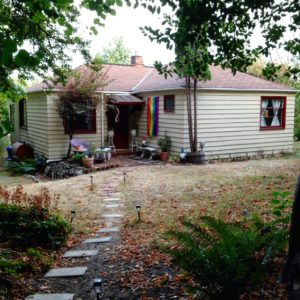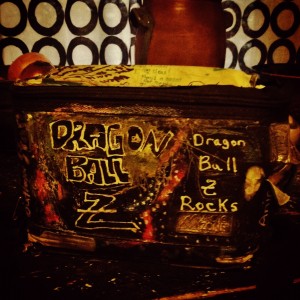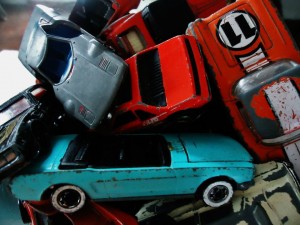On the darkest nights, when the wind is howling through the tousled trees and leaves are rustling off their dripping branches—and the beams in the attic are groaning, popping from the barometric pressure and moisture—I feel as though this small cottage is a battered dinghy bobbing in a raging tempest. But somehow, its warped, wooden framing and patched, plastered seams always bolster it just enough—holding it firm, silently enduring the onslaught in the dark.
And then, hours later, as morning light diffuses through the seemingly impenetrable, gray cloud banks, I watch the once forceful rain drip lazily from scuffed eaves and rusted, leaking rain spouts.

This, our home, has delivered us, its cargo, to another day.
***
As a kid, my overblown conception of a personal Eden featured a sprawling, multi-room Gothic mansion set in an open, browned field with trees lining its overgrown edges. Never did I imagine a small, dank cottage to supplant that fantasy.
When I think about the beauty of this place—what it has endured—I’m awestruck. Somehow, amid multiple housing booms and a changing skyline, it remained tucked away, sheltered behind behemoth rhododendrons and partially veiled with ivy. Coupled with pervasive rot, its decades-long neglect should’ve doomed it to become a mouldering, collapsed heap on the low, bramble-packed terrace.
And yet it remained upright long enough for a half-broken man and his faithful sidekick to move in and make it the best home they’ve ever had. But now, our time here is inching to an end.
I continue to water my plants, weed my flower beds—knowing that, as the tides swell and slowly pull this refuge from my grasp, I’ll be left unmoored in uncertain waters, reaching for a lifesaver. And honestly, I don’t know what it’ll look like.
My internal refrain has often been, As soon as you’re priced out of this home, that’s it. Back East you go. Mostly because the painful prospect of moving again is blunted by the comforting thought of returning to a place where I first made a home. But with no savings—and no ability to save—and no job prospects way over there, settling into a joyless, cookie-cutter studio miles away from the places I enjoy is my only recourse: debilitatingly sad, but pragmatic.
Seattle is lovely. It’s liberal. It’s scenic. There’s great thrifting. And it’s only a few hours away from Justin Trudeau. But I moved here coupled, with a fiscal buffer; together, it all worked—until we didn’t. Through a combination of begging my landlord and reducing every single expense I possibly could, I managed to pull this place—and myself—together over the past year. Always, though, the specter of another year loomed menacingly, with its associated cost-of-living spikes. But for a time, I was able to occupy my thoughts with surviving, rather than thinking about my imminent displacement as I’d done every moment since I’d taken over the lease. After all, I had another year, full of potential—something would come of my attempts to change my situation.
But here I am, slipping along the downward slope of my current leasing cycle, knowing that begging will do nothing now; even the slightest rental increase will make this place unreachable. The bubble continues to expand in Seattle, and there’s no cathartic burst in sight. With an entire paycheck consumed by rent, and the other pulled apart to satiate the utility, car loan, and credit card gods, I usually have between $5 and $15 left at the end of the month—and that’s if everything else stays consistent, which it never does. Unless you’re in corporate, being single in Seattle means you scrape by—you survive; you don’t live.
Seattle is no longer the grunge scene-inspiring, gritty city of the Cobain years. It’s now a polished playground for the rich—where upwardly mobile Millennials with six-figure salaries wave goodbye to longtime tenants and homeowners—most of whom are people of color who have to watch their neighborhoods be shattered by multi-million dollar box houses with Black Lives Matter signs posted out front, or re-zoned for massive micro-studio complexes.
I was silly to think I’d be an exception—that I, a relative newcomer, and of all the people displaced by Seattle’s boom, would somehow hold steadfast in my battered rental cottage against the raging tides of gentrification.
I fantasized about Gay Gardens being the place where I’d make it as a writer—no one famous, but earning just enough to stay put, save up, and buy this little place as ravenous Microsofties and Amazonians gobbled up everything around me. And then I’d slowly will my other dreams into reality.
I wouldn’t have to think about selling off most of my things just so I could afford to be displaced. I wouldn’t have to imagine the carefully crafted outdoor spaces I’ve built out of nothing being plucked apart by yard salers—bird houses and garden baubles and outdoor furniture snapped up like carrion for crows. I wouldn’t have to eventually hand over my keys and walk up the front stairs to a laden car, looking back over my shoulder at my Eden: the future site of million-dollar mansions. And I wouldn’t have to acknowledge that this place will soon be gone—face the imminence of a backhoe plowing headlong into the living room, its bucketed arm pivoting to level the tiny bedroom where I curled up my first night alone in five years and sank into the inky darkness of the forested hollow around me.
***
JoJo and I complete our around-the-house circuit, and as we reach the front patio, she stares up with her watery eyes, pleading for more time.
“Alright, we’ll go around again.”
Leaves cascade down from the gusting wind, their brittle edges reminding me that I won’t experience another fall here—staring out from the sun porch’s wavy-glassed windows while cradling a cup of hot coffee.
I’ll be somewhere else—probably in a large apartment complex in Tukwila with paper-thin walls listening to my neighbors squabble. But, with hope, in the depressing box that awaits me, I’ll be able to save enough money to pay off my credit card—racked with car repairs and heating bills rather than fanciful vacations and pedicures—and save enough money to move back to the East coast, or someplace I can actually live.
The wind nips my back as I run my hands along the weathered wood pallet garden wall. I clutch it hard, my knuckles turning white.
I wanted to build so much more here.
Back inside, as I warm her towels in the dryer, JoJo claws her way up into my lap. Her head, heavy with sleep, thuds quietly into my chest as she blows a snot-laden sigh into my orange cardigan.
I rest my chin on her tiny head, exhale deeply, and murmur through tear-clouded eyes, “Wherever you are is home.”



